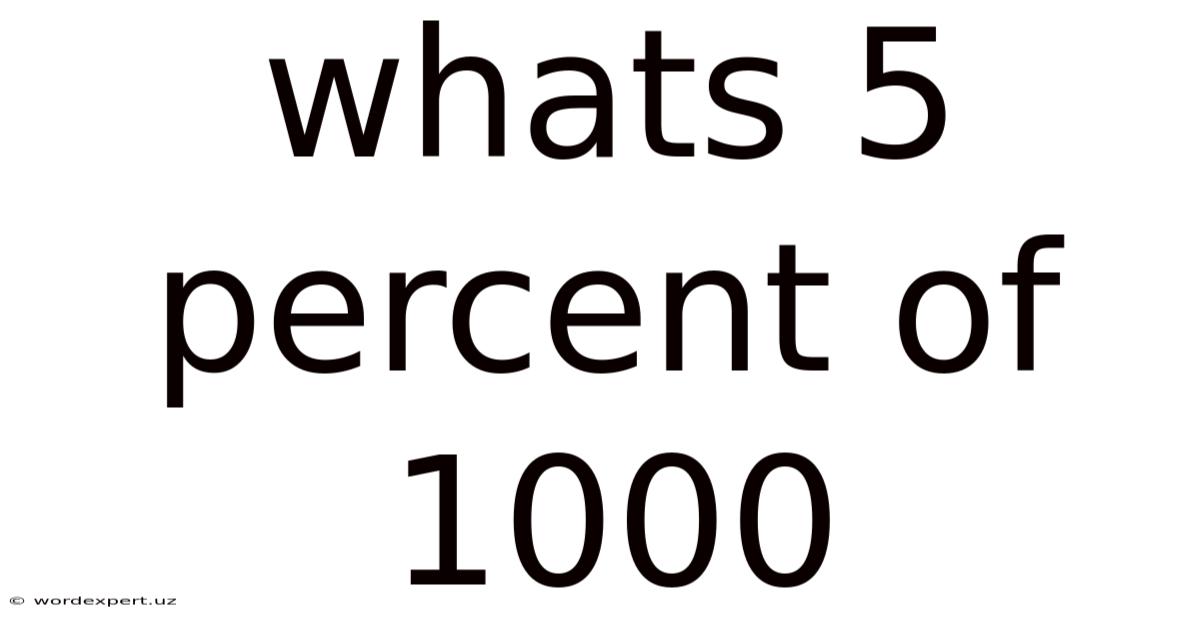Whats 5 Percent Of 1000
wordexpert
Sep 21, 2025 · 4 min read

Table of Contents
What's 5 Percent of 1000? A Deep Dive into Percentages and Their Applications
Finding 5 percent of 1000 might seem like a simple calculation, but understanding the underlying principles of percentages opens doors to a world of practical applications in various fields. This article will not only answer the question directly but also explore the concept of percentages, different methods for calculating them, and real-world examples demonstrating their importance. We'll delve into the mathematics, explain the logic, and even touch upon how to perform these calculations mentally for quick estimations.
Understanding Percentages
A percentage is simply a fraction expressed as a part of 100. The word "percent" comes from the Latin "per centum," meaning "out of a hundred." So, 5% literally means 5 out of every 100. This fundamental understanding is key to solving percentage problems.
Calculating 5% of 1000: The Direct Approach
The most straightforward method to calculate 5% of 1000 involves converting the percentage to a decimal and then multiplying.
-
Step 1: Convert the percentage to a decimal: To convert a percentage to a decimal, divide the percentage by 100. In this case, 5% divided by 100 equals 0.05.
-
Step 2: Multiply the decimal by the whole number: Multiply the decimal (0.05) by the whole number (1000). This gives us 0.05 * 1000 = 50.
Therefore, 5% of 1000 is 50.
Alternative Calculation Methods
While the direct approach is efficient, understanding alternative methods can broaden your mathematical skills and allow for flexibility in different scenarios.
Using Fractions
Percentages can also be represented as fractions. 5% is equivalent to the fraction 5/100. To find 5% of 1000, we can multiply the fraction by 1000:
(5/100) * 1000 = 50
This method highlights the direct relationship between fractions and percentages.
The Proportion Method
The proportion method is useful for solving more complex percentage problems. We set up a proportion:
- Part/Whole = Percentage/100
In our case:
- x/1000 = 5/100
To solve for x (5% of 1000), we cross-multiply:
-
100x = 5000
-
x = 5000/100 = 50
Mental Math Techniques for Quick Estimations
For quick estimations, especially in everyday situations, mental math shortcuts can be invaluable.
-
Breaking it down: 5% can be thought of as half of 10%. 10% of 1000 is easily calculated as 100 (move the decimal point one place to the left). Half of 100 is 50.
-
Using multiples of 10: Working with multiples of 10 simplifies calculations. Finding 10% is straightforward, and adjusting from there based on the required percentage is simple.
Real-World Applications of Percentage Calculations
Percentages are ubiquitous in our daily lives, appearing in various contexts:
-
Finance: Calculating interest rates on loans, savings accounts, and investments. Understanding discounts and sales tax. Analyzing financial statements and investment returns.
-
Sales and Marketing: Determining profit margins, calculating discounts and sales, analyzing market share, and understanding conversion rates.
-
Science and Statistics: Expressing experimental results, calculating probabilities, and interpreting data in scientific studies.
-
Education: Calculating grades, understanding test scores, and analyzing student performance.
-
Everyday Life: Calculating tips in restaurants, understanding discounts in stores, interpreting nutritional information on food labels, and comprehending statistics related to weather, population, and more.
Understanding Percentage Increase and Decrease
The concept extends beyond simply finding a percentage of a number. We often encounter situations involving percentage increases or decreases.
-
Percentage Increase: Suppose a product's price increases by 5%. If the original price was 1000, the increase would be 50 (5% of 1000). The new price would be 1050 (1000 + 50).
-
Percentage Decrease: If the price decreases by 5%, the decrease would still be 50. The new price would be 950 (1000 - 50).
Solving More Complex Percentage Problems
The principles discussed can be extended to solve more complex problems. For example, finding what percentage one number represents of another:
What percentage is 50 of 1000?
- (50/1000) * 100% = 5%
Frequently Asked Questions (FAQ)
Q: How do I calculate a different percentage of 1000?
A: Follow the same steps as outlined above, substituting the desired percentage for 5%. Convert the percentage to a decimal and multiply by 1000.
Q: What if I need to calculate a percentage of a number other than 1000?
A: The process remains the same. Simply replace 1000 with the new number and proceed with the calculation.
Q: Are there any online calculators for percentages?
A: Yes, many online calculators are readily available to assist with percentage calculations. These can be particularly helpful for more complex problems.
Q: How do I handle percentages greater than 100%?
A: Percentages greater than 100% simply indicate a value exceeding the original amount. The calculation process is identical; you'll simply obtain a result larger than the original number.
Conclusion
Calculating 5% of 1000, while seemingly simple, provides a foundation for understanding the broader concept of percentages. Mastering percentage calculations is essential for navigating various aspects of life, from personal finance to professional fields. By understanding the different methods of calculation and their applications, you'll be equipped to tackle a wide range of percentage-related problems with confidence. Remember to practice regularly and explore different approaches to solidify your understanding and build your mathematical skills. The more you practice, the easier and more intuitive these calculations will become.
Latest Posts
Latest Posts
-
What Is 2 Of 400
Sep 21, 2025
-
How Many Oz Is 50g
Sep 21, 2025
-
Cuantos Kilometros Son 2 Millas
Sep 21, 2025
-
Sales Tax Calculator Missouri Vehicle
Sep 21, 2025
-
Bathing Suits And Body Types
Sep 21, 2025
Related Post
Thank you for visiting our website which covers about Whats 5 Percent Of 1000 . We hope the information provided has been useful to you. Feel free to contact us if you have any questions or need further assistance. See you next time and don't miss to bookmark.